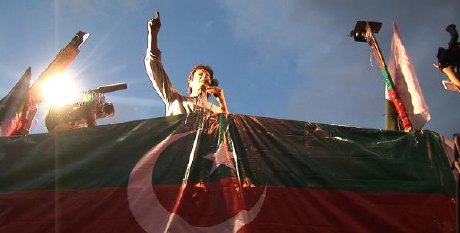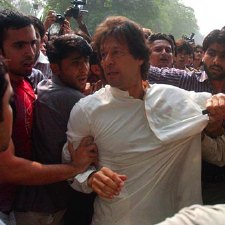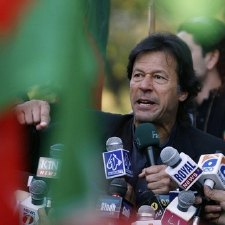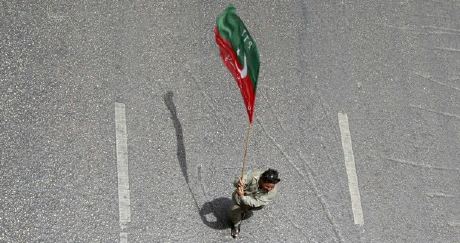Like many Pakistanis, I admire Imran Khan and his sincerity. But supporting him politically is a different matter. He and his party – Pakistan Tehreek-i-Insaaf (PTI) – have some serious soul searching to do before people give it their political support.
Imran Khan is one of the few principled politicians we have. There is no doubt that he truly cares about the country. His bold stance on May 12 and his consistent support for the restoration of the judiciary was unmatched by any other prominent politician. His cancer hospital and the projects he has started in the field of education have been praised even by many of his critics.
Someone like myself, who is dissatisfied with the politics and corruption of the leading parties, is naturally attracted to Imran Khan who talks about principles and accountability. However, as much as I like Imran for his honesty and devotion to the country, I have some concerns about him and can not help agreeing with Shafqat Mahmood’s statement that Imran never misses an opportunity to miss an opportunity.
Being politically inclined, I have even considered joining PTI at times, but reservations about his politics prevent me from doing so.
Imran Khan has been in politics for 13 years, and this is a long enough period to develop the party into a vibrant, democratic entity. Unfortunately, PTI still comes across more like an Imran Khan fan club rather than a democratic political party. For the most part, there is an absence of grass roots forums that meet regularly where any party member can raise issues and be heard, and the party line almost completely comes from the top.
Secondly, Imran does not realize that politics requires an appropriate mix of idealism and pragmatism and confuses this balancing act with opportunism. If he wants to serve the people of Pakistan by coming into power, then his decisions should be geared towards that goal. He had an excellent opportunity to launch himself when Nawaz Sharif offered him 20 odd seats in 1997 and again when Musharraf was willing to help him become the prime minister. Instead of spurning these offers, he should have taken a few ministries and worked hard on demonstrating through performance that he was someone who could truly deliver if given a chance. This could have provided him with the impetus needed to launch PTI into a force capable of getting elected into power on its own and then implement its reform agenda.
This unwillingness to balance idealism and pragmatism also creates doubts about his ability to deliver even if he came into power some day. It makes one wonder whether he would really take a practical approach towards addressing the country’s problems.
On top of all this, Imran Khan has a very confused stance on the Taliban where he still falls well short of fully condemning them.
He has been very consistently and forcefully bashing the Americans in recent years but the same kind of condemnation for the Taliban has not been forthcoming. This sharp contrast, when the Taliban have killed many more Pakistanis than the American drones, and when they are directly trying to destroy the state structure to establish their own rule, is hard to understand. It has taken some strong criticism for Imran Khan to finally make a few “too little too late” statements criticizing the Taliban, whereas what one expects from a good leader is the ability to clearly identify and point out a problem well ahead of time.
His stance on the current situation in Swat has again left a lot to be desired. He first vehemently opposed the military operation but did not explain what the government should do when the Taliban break a peace agreement and keep on expanding into neighbouring districts as they blatantly did after the Swat deal. Only after coming under regular fire has he finally accepted that a military operation can also be an option. He rightly says that bombings should be avoided and the operation should be carefully targeted, but the national debate could have been more focused on discussing how military action can be carried out in a way that minimizes civilian suffering if he and others had not been creating confusion by insisting that there should never be an operation.
In yet another example of muddled thinking, he now argues that before sending the army, a group of politicians should have been allowed to go and try to convince the Taliban to abide by the Swat peace deal. This makes one wonder why he did not publically propose this in the days leading up to the operation and what he is trying to accomplish by undermining the military’s efforts now that the time for this idea has clearly passed.
I really admire Imran Khan for his sincerity, but these are some of the serious issues that he and his party have to come to grips with, before PTI can make serious headway in realizing its full potential.























































my brother aqil sajjad!! you clearly lack information. how can we be so sure that the ones killing pakistanis are taliban and not indians or iranians, or americans, or russians. how many of the suicide bombings have been claimed by the talibans.
my friends remember lal masjid? think swat to be a lal masjid. the demands in both the cases are the same. what was the result? think about it…. we all will know when its over….the results and the consequences!!
What is laughable was Imran Khan alternative to a military operation that army be withdrawn from FATA and Swat and that the locals should be tasked with handling the Taliban
The locals do not have the military training or heavy weaponry or plain fantacism to handle the Taliban. Only when the military enters an area and makes a determined effort, do the locals rise up against the Taliban and partner with the military to defeat the Talibums.
If we had followed Imran Khan’s suggestions, the Taliban would be in Islamabad right now and advancing towards Lahore, leading even the PML-N flip-floppers to finally take a stand against them.
Brother Aamir; Neither Imran Khan, neither Qasim nor myself are avoiding the issue of dealing with militants. It is an issue that has to be given the highest priority as it is important for the National interest. The US and the NATO have realised after 8 years and billions of dollars that they cannot overcome the Taliban problem militarily…or only using military. Why can we not learn from the experience of others rather than commit the same mistakes all over again.
It is imperative for the solidarity and integrity of Pakistan that whatever tactic we adopt now in the short term be well integrated with a long term strategy for the entire affected area….This is exactly what Imran Khan stands for; and this is the only approach that will rid the country of Taliban in particular and in the broader term every form of extremism.
I sincerely believe that we cannot afford to keep on living in a fools paradise and believe in the rhetoric that the only issue facing us is the 15,000 or so militants. If this is so, then with an army and para military forces numbering close to a million they should be no match and we should be able to kill each one of them and get the country rid of this curse once and for all. This won’t work as the people who are funding and supplying weapons to these militants will find another 15,000 brainwashed individuals who will be ready to go to Hell; thinking that they are going to heaven. Therefore, there is no shortcut; we have to hit at the root of the problem
Correction: the documentary isn’t called The Obama Doctrine, it’s The Obama Deception.
@Aamir,
But that’s the thing. Imran Khan isn’t against the current operation. He’s said that doing a half hearted operation, not tackling the militants in a full frontal manner now would cause greater problems down the lane. If you’re interested, read the “Where I Stand” article he wrote in The News, it’s available online on his party’s website or through google.
All he wants is that the military operation be backed by a broader framework of political objectives, to decrease the plight of the people living there and to rehabilitate the cities and towns in a timely manner, addressing the most pressing political and civil concerns IDP’s face when they return back home. That makes perfect sense to me. Doing anything else.. not taking care of returning IDP’s and eating up earmarked rehabilitation money in bribes for corrupt, incompetent politicians would cause widespread resentment.
And without understanding the militant phenomenon and it’s source properly, we can spend years crushing one movement after the next. If the sources that empower, fund, and encourage such militancies are left to be, we’d be dealing with one movement in Waziristan, and crushing that, another in Balochistan, maybe then in southern Punjab. I know it sounds like some wild conspiracy theory, but do some research into this. These strategies aren’t new, it’s the modus operandus of some of our big “friends”. Holbrooke was the US point man in Yugoslavia, and his effective strategies for breaking up the country there are dubbed the “yugoslav doctrine”, and that’s what’s being applied on Pakistan. You should research into this, it is facincting stuff. Watch The Obama Doctrine if you like, it’s a documentary covering this stuff. There are important questions, such as from where the militants get their logistics support, millions of bullets, food rations for thousands of people three times a day, and why the army raised the issue of a tremendous number of US army issue weaponry being used by these militants. Each gun has a serial number, and you can’t loose a single gun without there being an investigation into the circumstances.
There is a bigger picture that we need to understand. We Pakistanis seem to focus on short-term objectives too much. These short-term objectives need to be the part of a bigger long-term strategy to deal with our pressing problems in an effective, decisive manner.